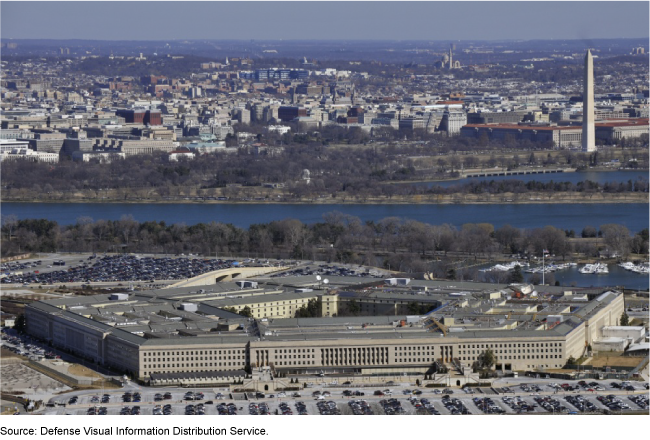Post-Government Employment Restrictions: DOD Could Further Enhance Its Compliance Efforts Related to Former Employees Working for Defense Contractors
Fast Facts
Employees who leave DOD to work for DOD contractors may face restrictions designed to protect against conflicts of interest. For example, they are permanently prohibited from attempting to influence their former agency about a project they worked on. Congress recently added restrictions on lobbying by former DOD officials.
We found DOD improved its efforts to inform departing employees of post-government employment restrictions through training and more.
However, DOD doesn't require contractors to affirm that their employees are in compliance with the latest restrictions. We recommended DOD consider updating its regulations to do so.

Highlights
What GAO Found
Situations in which senior and acquisition officials leave the Department of Defense (DOD) and go to work for defense contractors can lead to conflicts of interest and affect public confidence in the government. There are federal laws that place limitations on the employment of former DOD officials. The 14 major defense contractors GAO reviewed hired about 1,700 recent former DOD senior civilian and military officials, such as a general or admiral, or former acquisition officials (see table).
2019 Employment of Former Department of Defense (DOD) Personnel by the 14 Contractors GAO Reviewed
|
Category of former DOD personnel potentially subject to post-government employment restrictions |
Number of personnel who left DOD service from 2014 through 2019 |
Number employed in 2019 by the 14 contractors GAO reviewed |
|
Military and civilian senior or acquisition officials |
100,660 |
1,718 |
|
All other military and civilian employees |
1,397,222 |
35,314 |
|
Total |
1,497,882 |
37,032 |
Source: GAO analysis of DOD and Internal Revenue Service data. | GAO-21-104311
GAO found that DOD has improved certain practices to help ensure compliance with post-government employment (PGE) restrictions, including:
- processes for issuing and maintaining ethics opinion letters (written opinions DOD provides to its former officials seeking private sector employment), and
- training to increase DOD employee awareness about and understanding of PGE restrictions.
In 2011, DOD modified its acquisition regulations to require that contractors—when submitting proposals in response to DOD contract solicitations—represent their employees' compliance with several PGE restrictions. DOD has not considered incorporating a recent restriction on lobbying activities into that regulation. DOD officials noted that the restriction was not identified for potential regulatory action when it was enacted, and they have not considered doing so. Instead, DOD has issued guidance to defense personnel informing them of their responsibilities. However, without assessing whether to update the regulation to require that contractors represent their employees' compliance with the lobbying provision, DOD may be missing an opportunity to create a shared sense of accountability between the employees and the contractors who hire them, and a means of ensuring that DOD does not do business with companies whose employees violate the lobbying restriction with their employers' knowledge.
The 14 defense contractors GAO reviewed reported that they use various methods to comply with PGE restrictions. GAO found that the specific practices differed by type of contractor. Contractors that develop and produce weapon systems reported having more practices in place to promote compliance with PGE restrictions than did contractors that generally provide commercial products and services.
Why GAO Did This Study
Each year, civilian and military personnel leave DOD and go to work for contractors that do business with DOD. These individuals are potentially covered by laws restricting their new employment activities. The laws—some of which include penalties for violations—seek in part to protect against conflicts of interest and to promote public trust in the integrity of the government's decision-making processes, which facilitate the award of contracts worth hundreds of billions of dollars annually.
The conference report accompanying the National Defense Authorization Act for Fiscal Year 2020 included a provision for GAO to update its 2008 report on major defense contractors' recent employment of former DOD officials. This report (1) identifies the extent to which major defense contractors employed potentially covered ex-DOD officials in 2019, and (2) examines practices DOD and contractors use related to contractors hiring former DOD officials. GAO reviewed and surveyed 14 selected defense contractors with obligations above a certain dollar threshold. GAO also reviewed DOD documentation, and interviewed agency officials and contractor representatives.
Recommendations
GAO recommends that DOD assess whether to incorporate recent lobbying prohibitions into its acquisition regulations. DOD concurred with the recommendation.
Recommendations for Executive Action
| Agency Affected | Recommendation | Status |
|---|---|---|
| Department of Defense | The Under Secretary of Defense for Acquisition and Sustainment should ensure that the Principal Director, Defense Pricing and Contracting, assesses whether to amend the Defense Federal Acquisition Regulation Supplement to require contractors to represent their employees' compliance with the PGE lobbying restrictions established by Section 1045 in the National Defense Authorization Act for Fiscal Year 2018 as part of a contractor's proposal for DOD contracts. (Recommendation 1) |
DOD agreed with this recommendation. DOD stated that the Principal Director, Defense Pricing and Contracting, has conducted the recommended assessment and initiated actions to amend the Defense Federal Acquisition Regulation Supplement (DFARS). On September 15, 2021, the department opened DFARS case 2021-D030, entitled Representation Relating to Compensation of Former DOD Officials, and the Director of the Defense Acquisition Regulatory Council tasked staff to draft the revised DFARS language.
|
